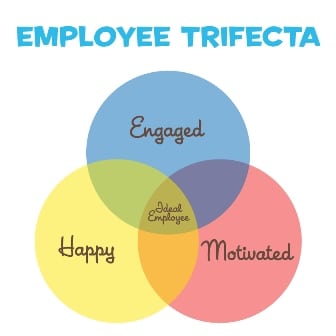All companies depend on their employees to do their jobs. But great companies can depend on their employees to do their jobs well, with creativity and enthusiasm – in other words, employees that are engaged are highly productive and successful, promoting the success of the company itself.
So how can you ensure that your employees stay engaged in the long term?
1. Importance
When employees feel that they have an important role or that the work they’re doing is important, they stay engaged. Let them know that their role is important without overselling it. Reward them in meaningful ways for meaningful work. Get to know employees. Find out what their goals are, what they feel should be important about their job, and then make sure they are encouraged to follow their passion.
2. Tools and Expectations
On one side of every job are the expectations that the employee, the boss, and the company have for a position. On the other side are the tools that allow the employee to live up to those expectations. Make sure that each employee understands what they’re expected to do and that they have the necessary tools to be successful.
3. Train Employees in Conflict Resolution and Problem Solving
Another key to ensuring employees are engaged is ensuring that everyone works well together as a team. Being able to solve problems and resolve conflicts in a constructive way will help everyone to work together well. It will also help your employees to better interface with clients, customers, suppliers, or service providers.
4. Be Consistent
Rather than getting everyone excited about a big plan to improve engagement, take small steps to ensure that each employee is consistently getting the feedback they need. Constructive criticism can be just as powerful as rewards, as both demonstrate the importance of the work being done.
5. High Expectations, Lots of Flexibility
Start with high expectations and let go of things you think you don’t like about employees. People are likely to live up to expectations, whether high or low, so foster the performance you would like to see from everyone. But remember not to be overly judgmental or harsh if they don’t get their immediately. Giving everyone the room to learn and grow towards lofty goals will ensure that they have something to work hard towards. Give them a helping hand up and they’ll return the favor with dedication and engagement.
6. Manage Company Culture
Listen to the conversations that employees have with one another. Listen to their stories about what’s going on at the company. The culture of a company can foster engagement, enthusiasm, and pride. But it can also foster distrust, disillusionment, and evasion of responsibility. When employees talk about positive experiences and laugh together, they are participating in a supportive and engaging work culture.
7. Ask for Feedback
Make sure that you’re getting the advice you need to do your job as well as possible. Check in with employees to see if they feel confident about your leadership or role. Be available and open to requests for help or constructive changes.
Increases in efficiency, productivity, and job satisfaction have been linked back to the way that employees are engaged. And it makes sense logically that a happy, satisfied employee will work harder and do better work. If employees like the company they work for and they feel the company appreciates their work, they’ll stick around and get better at what they do.
Facilitating this kind of long term relationship and growth is what anyone in leadership should be thinking about when making policy decisions about fostering engagement among employees.
